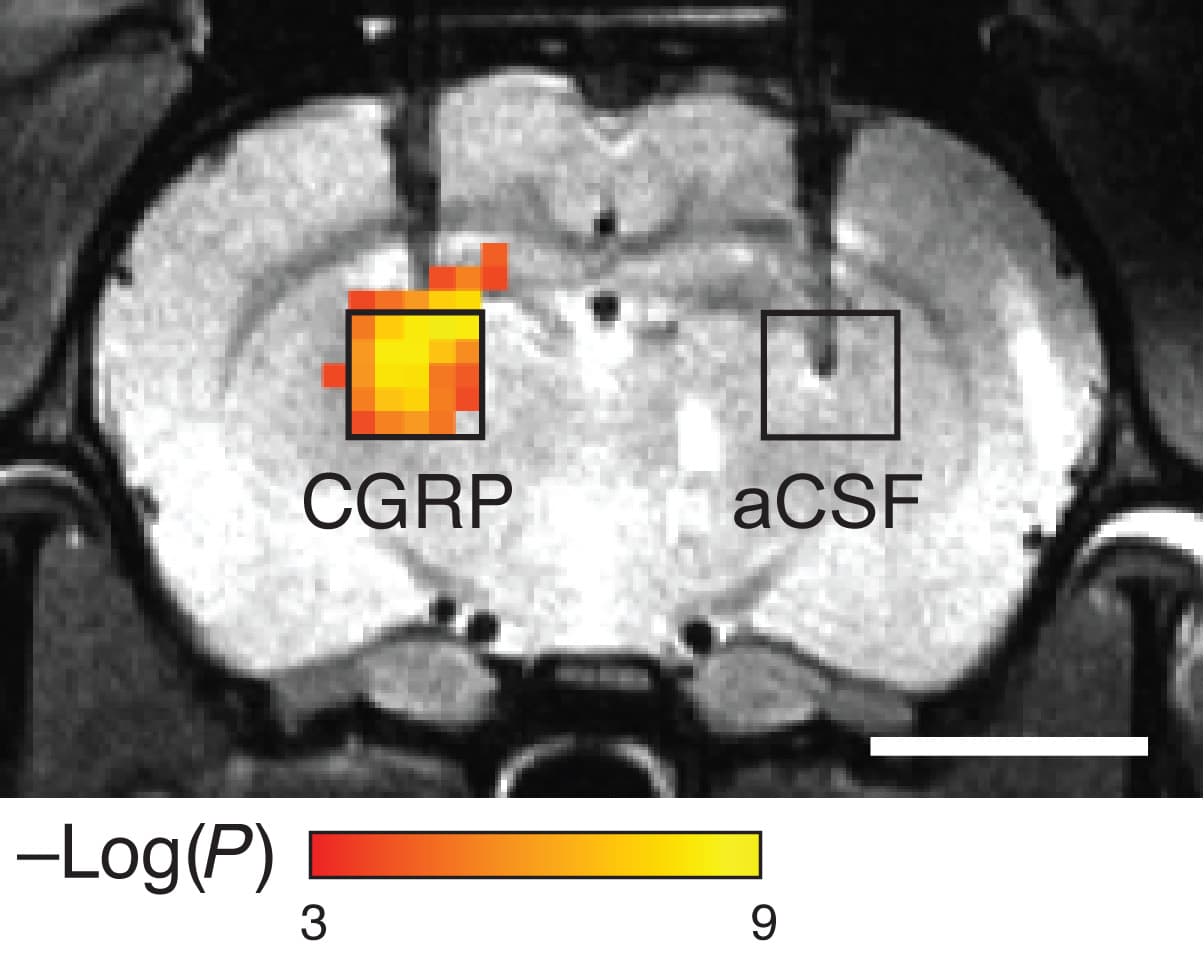Protein-Based MRI Probes To Deliver Greater Insights In Imaging Data - MIT
Researchers at MIT have devised a protein-based probe approach to perform MRI scans. Their team have come up with a protein- based sensor that responds to the techniques followed in MRI. The existing method uses radioactive probes to obtain imaging data. However, this new finding could revolutionize the field of MRI and imaging following a non-radioactive approach.
Despite of being able to do the task, radioactive probes offers lower resolution and lesser efficiency in imaging dynamic activities. The protein based sensor fills these gaps. These chemicals dilates the blood vessels in the brain, creating a change in flow of blood in the impact area. Imaging techniques like MRI are able to capture these responses, helping in obtaining a better picture of that activity.

Protein-Based Sensor (CGRP) Dilates The Blood Vessels Helping In Imaging Via MRI -Image Credits - MIT Press
The team, at first, started with the detection of protease enzyme to validate their work. They synthesized the probes using a naturally occurring peptide called calcitonin-gene-related peptide (CGRP). CGRP has been so engineered that its protein-built outer cage will disappear if any traces of proteases is detected. The impact area will follow dilation of blood vessels, causing a direct detection via MRI Imaging. A full detailed analysis of the process can be found in the Journal #-Link-Snipped-# that contains their work titled#-Link-Snipped-#.
Proteases are enzymes which are used as <a href="https://en.wikipedia.org/wiki/Biomarker" target="_blank" rel="nofollow noopener noreferrer">Biomarker</a>, especially in case of diseases like Cancer and Alzheimer. Detecting the site of their presence would help in tackling and understanding the diseases pretty well. Scientists are now trying to engineer other peptides that can detect chemicals like dopamine and serotonin - neuro-transmitters, which are responsible for processing emotions. Further, they are also interested in deriving ways to detect genes and their target cells. All these are part of their future goals that they are assured to achieve following more trials and experiment.
Source – <a href="https://news.mit.edu/2016/radiation-free-approach-imaging-molecules-brain-mri-1202" target="_blank" rel="nofollow noopener noreferrer">A radiation-free approach to imaging molecules in the brain | MIT News | Massachusetts Institute of Technology</a> | #-Link-Snipped-#
Despite of being able to do the task, radioactive probes offers lower resolution and lesser efficiency in imaging dynamic activities. The protein based sensor fills these gaps. These chemicals dilates the blood vessels in the brain, creating a change in flow of blood in the impact area. Imaging techniques like MRI are able to capture these responses, helping in obtaining a better picture of that activity.

Protein-Based Sensor (CGRP) Dilates The Blood Vessels Helping In Imaging Via MRI -Image Credits - MIT Press
The team, at first, started with the detection of protease enzyme to validate their work. They synthesized the probes using a naturally occurring peptide called calcitonin-gene-related peptide (CGRP). CGRP has been so engineered that its protein-built outer cage will disappear if any traces of proteases is detected. The impact area will follow dilation of blood vessels, causing a direct detection via MRI Imaging. A full detailed analysis of the process can be found in the Journal #-Link-Snipped-# that contains their work titled#-Link-Snipped-#.
Proteases are enzymes which are used as <a href="https://en.wikipedia.org/wiki/Biomarker" target="_blank" rel="nofollow noopener noreferrer">Biomarker</a>, especially in case of diseases like Cancer and Alzheimer. Detecting the site of their presence would help in tackling and understanding the diseases pretty well. Scientists are now trying to engineer other peptides that can detect chemicals like dopamine and serotonin - neuro-transmitters, which are responsible for processing emotions. Further, they are also interested in deriving ways to detect genes and their target cells. All these are part of their future goals that they are assured to achieve following more trials and experiment.
Source – <a href="https://news.mit.edu/2016/radiation-free-approach-imaging-molecules-brain-mri-1202" target="_blank" rel="nofollow noopener noreferrer">A radiation-free approach to imaging molecules in the brain | MIT News | Massachusetts Institute of Technology</a> | #-Link-Snipped-#
0

